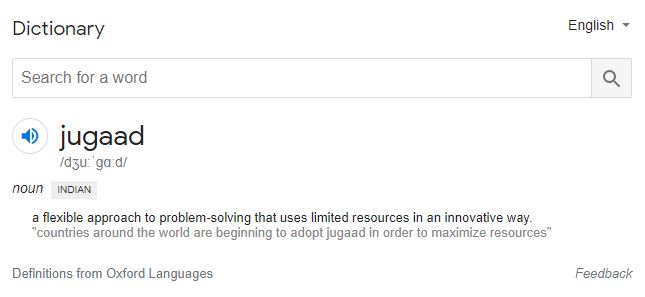What is Jugaad and what can you learn from this special technique of solving problems? Jugaad is improvising on limited resources. It can be inducted into strategy and product development. Although the concept of jugaad as a fast, frugal innovation comes from India, other places have their own analogs. Let us look at an overview of this concept and see how that can be used in a managerial context.
Now, let us look at different ways to define jugaad. In fact, we can write an entire essay just defining jugaad. However, it makes more sense to summarize some of the definitions so that it is faster and easier to understand.
| Theme | Definition | Author |
| Bricolage | “…jugaad is widely used in India to describe improvised, innovative or out-of-the-box ways of solving a problem due to lack of resources” | Garud and Prabhu, 2020 |
| Frugal innovation | “overcoming harsh constraints by improvising an effective solution using limited resources” | Radjou et al., 2010 |
| Negative impact on society | Jugaad is response to India’s systemic risk. Demand for growth coupled with minimal resources leads to creation of quick solutions called jugaad | Birtchnell, 2011 |
| Innovation | “Hindi word meaning innovative fix, an improvised solution born from ingenuity and cleverness; resourcefulness” | Rajdou, Prabhu and Ahuja |

Next, we look at a practical example to demonstrate the meaning of jugaad. In some rural areas in India, jugaad word is used for these jalopies. Older engines from motorcycles, cars, water pumps, etc used to fabricate vehicles to carry people. This vehicle is technically illegal in India. Nevertheless, that is not a deterrent for poor people to get around and some people to make money from driving around these vehicles. If you observe closely, it is only a wooden platform resting on a two-wheeled cart. The wheels are made from tractor front wheels hence sturdy to carry loads in excess of 2000kg or 2 metric tons. Usually, there is one wheel or sometimes two wheels at the front. The driver sits near an engine, generally derived from old motorcycle engines.

Contents
Jugaad in other cultures:
This concept of frugal innovation is not limited to India alone. Moreover. other countries across the world have some words for this kind of solution-oriented approach. Some of these are listed below:
| Country | Jugaad analog |
| United States | Redneck technology, Do It Yourself |
| Japan | Urawaza |
| Africa | Jua kali |
| China | Zizhu Chuangxin; Cha bu duo |
| France | Système D ; tu te démerdes |
The relevance of Jugaad in Management
Rajdou and Prabhu have talked about the applications of jugaad in their book Jugaad Innovation. One of the challenges faced by firms across the world is the growing demand for “value for money” products. These are products that offer premium value at a lower price. Recently, we have seen plenty of Chinese alternatives to well-established brands. While many of these products are questionable 3rd-grade copy, there are some true gems coming out of the land of dragons. On one hand, there are companies that cater to a niche market. For instance, companies like Fiio and Hifiman have continuously put pressure on western high-fidelity audio products. Similarly, many automotive companies like MG Hector are attempting to be the Hondas of today. Sometimes, they are successful, at times they are not. However, we can’t deny their role in innovation and bringing better quality products to more consumers. This also creates mimetic pressure on western companies to provide competing products.
Secondly, markets are moving towards emerging economies like Africa. We need simple, effective products for these markets. Google created their new logo in 2015 using a technique to reduce the size to mere 305 bytes. On the other hand, the earlier logo was around 14000 bytes. This may seem trivial for us surfing the net at 4g or 5g speeds. However, for a child in Somalia opening a browser on 2g speeds may benefit immensely from this small jugaad.
As a solution in uncertain times
The covid19 pandemic took the world by surprise. It was an unanticipated and sudden disruptor. It presented some of the peculiar challenges. We shall see two of such challenges and solutions to these problems:
- Remote classroom: Image a teacher. She realizes that the only way to reach her students is through video lectures. However, she does not have the required infrastructure. She eventually finds the solution in form of a jugaad. What is this jugaad? It is simply tying up a cloth hanger to the chair and ceiling fan and further attaching her phone through elastic bands to this hanger. This simple makeshift hanger helped her deliver a lecture without a tripod.
- Social distanced milk delivery: Maintaining social distance is important. At the same time, it was also important to deliver milk to the scores of customers. What seemed like an impossible task, required just an innovative mindset. A milkman created a contraption using PVC pipes and funnel to deliver milk while staying distant from the customers.
It may also provide life-saving solutions especially when the options are limited. One such example is the story of the Hollywood film Apollo 13. In this movie, the space crew is faced with an impending challenge. Therefore, they need to find out a way to maintain oxygen levels. The problem is that they have to make do with whatever they have in hand up there in space in limited time. Check out this clip to know more:
Measuring the ‘jugaad-ness’ of individuals
Bricolage is the approach of working with whatever you have. Generally, resource-constrained makes people reuse whatever they have and combine stuff to create something new and useful. Also, strategy literature also suggests that there is a value in the combination of existing capabilities. Using this approach can also bring down the cost of R & D for the firms. Moreover, you can use the Inventor Bricolage questions from the work of Garud and Prabhu published in 2020. This will help you operationalize the concept of jugaad in your organization.
Now, the next question comes up : how do you use it? Certainly, individuals who have higher propensity to involve in bricolage or jugaad will have higher chnaces of finding fast and frugal solutions to the problems.
FAQ
Speed and flexibility to create solutions
Work with limited resources
Overcoming the ‘binary logic’ of either perfect or imperfect product
Reduction of waste
A quick-fix solution may not last long
Habitually getting accustomed to the jugaad prevents a robust solution mindset
Systemic risk due to quick-fix solutions – for example, the emergence of slums around cities
